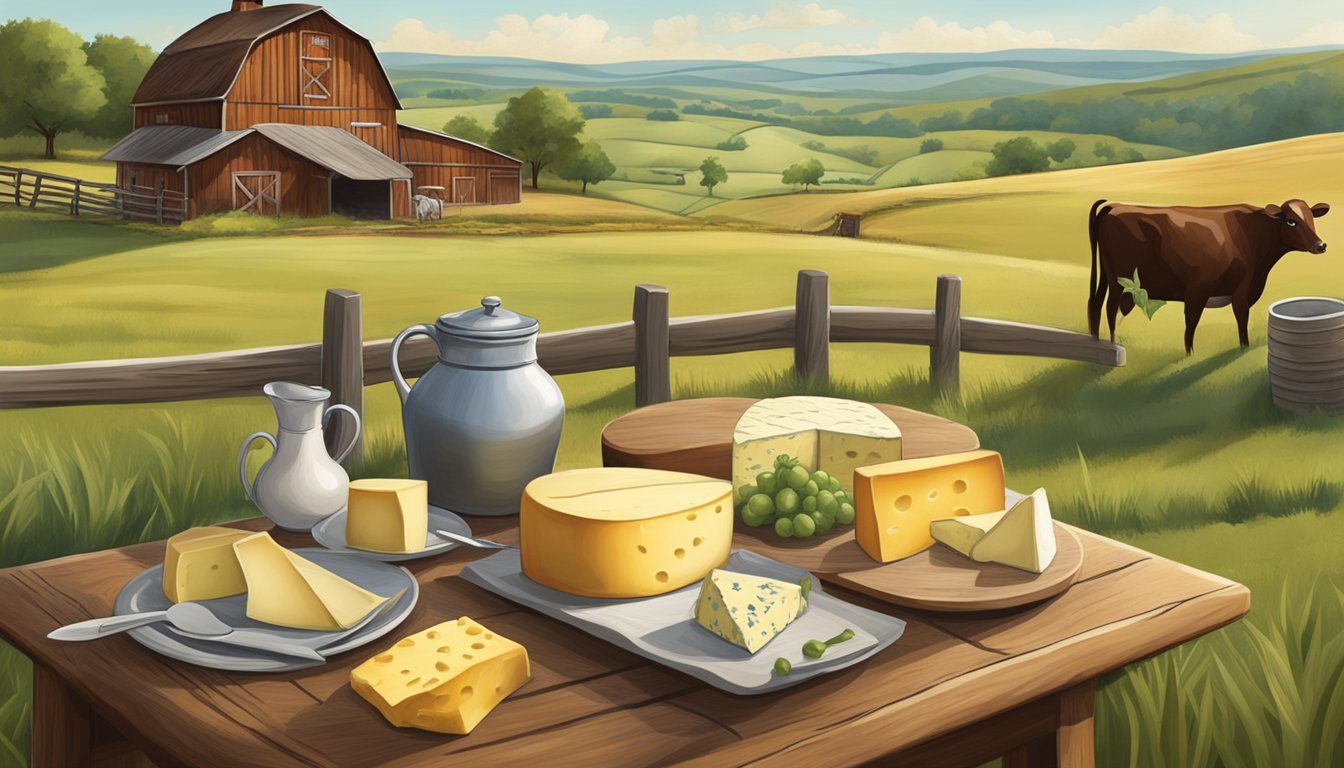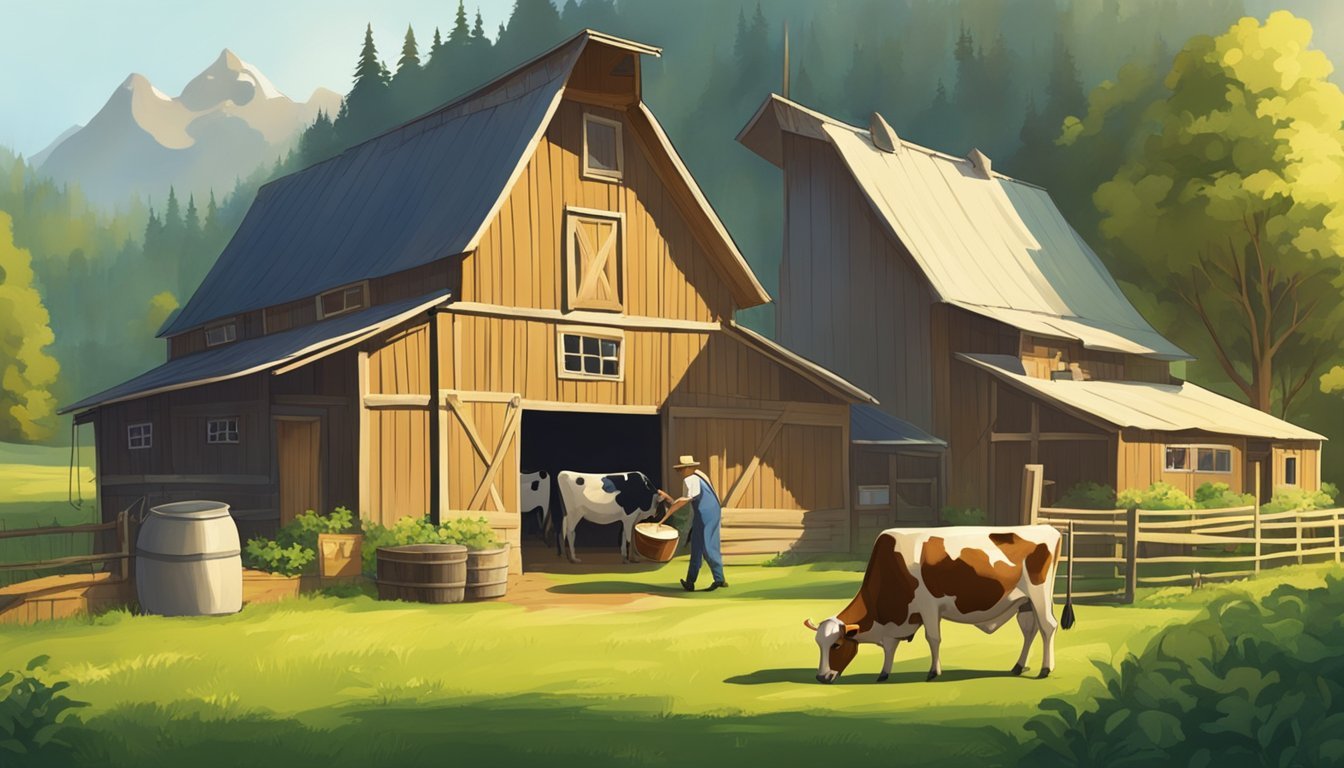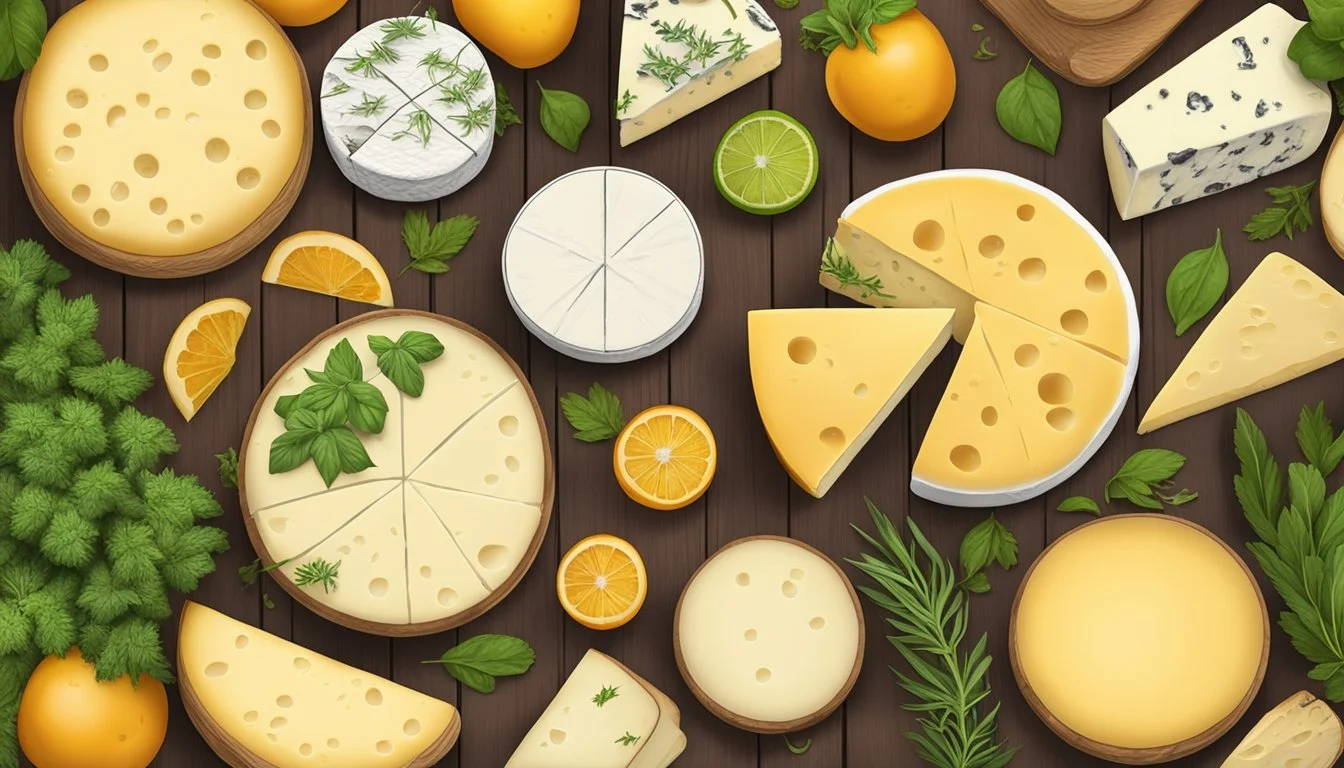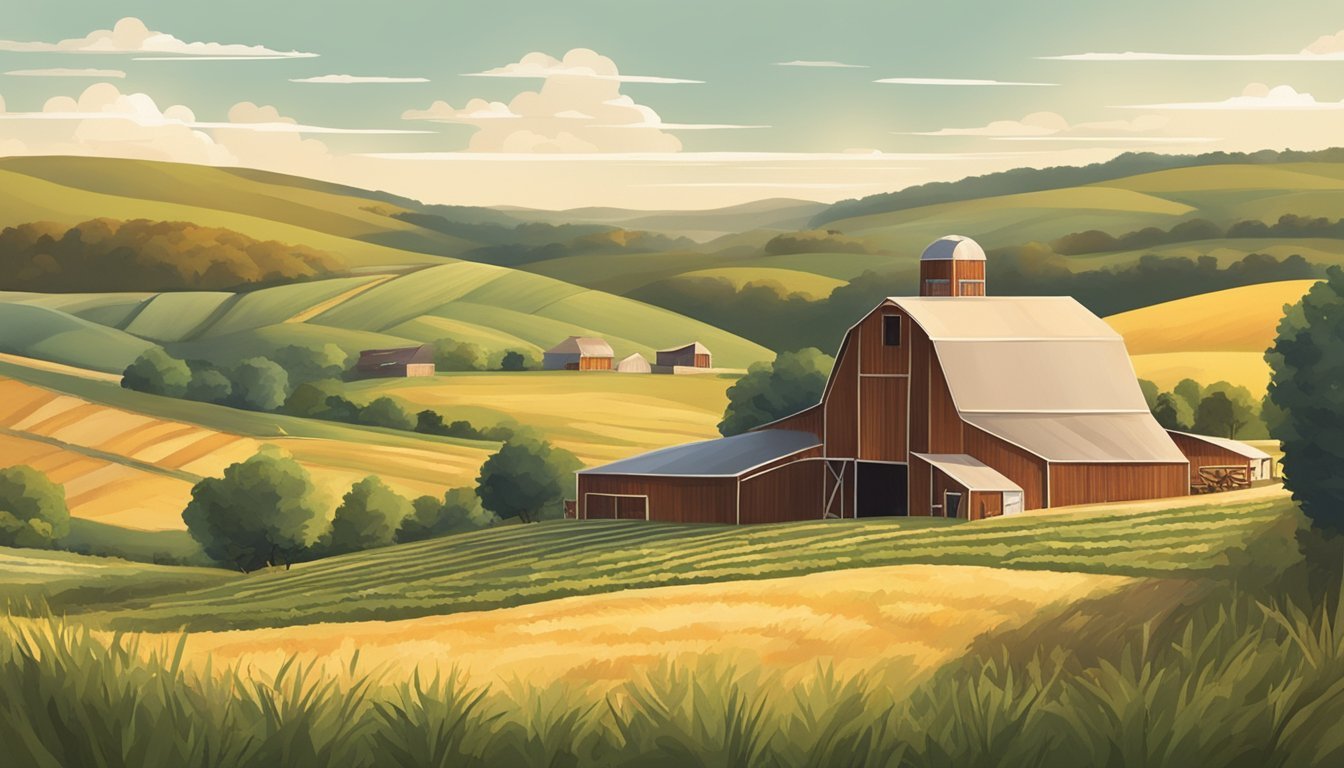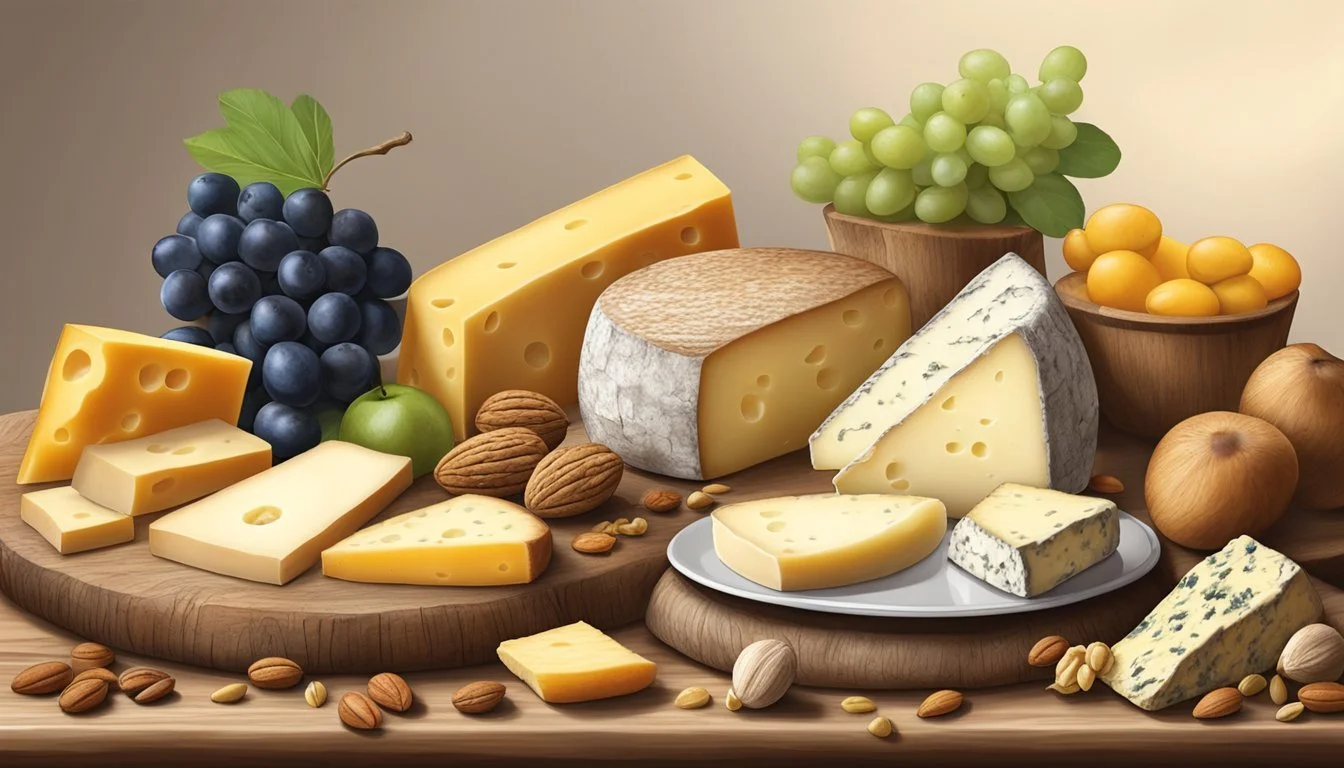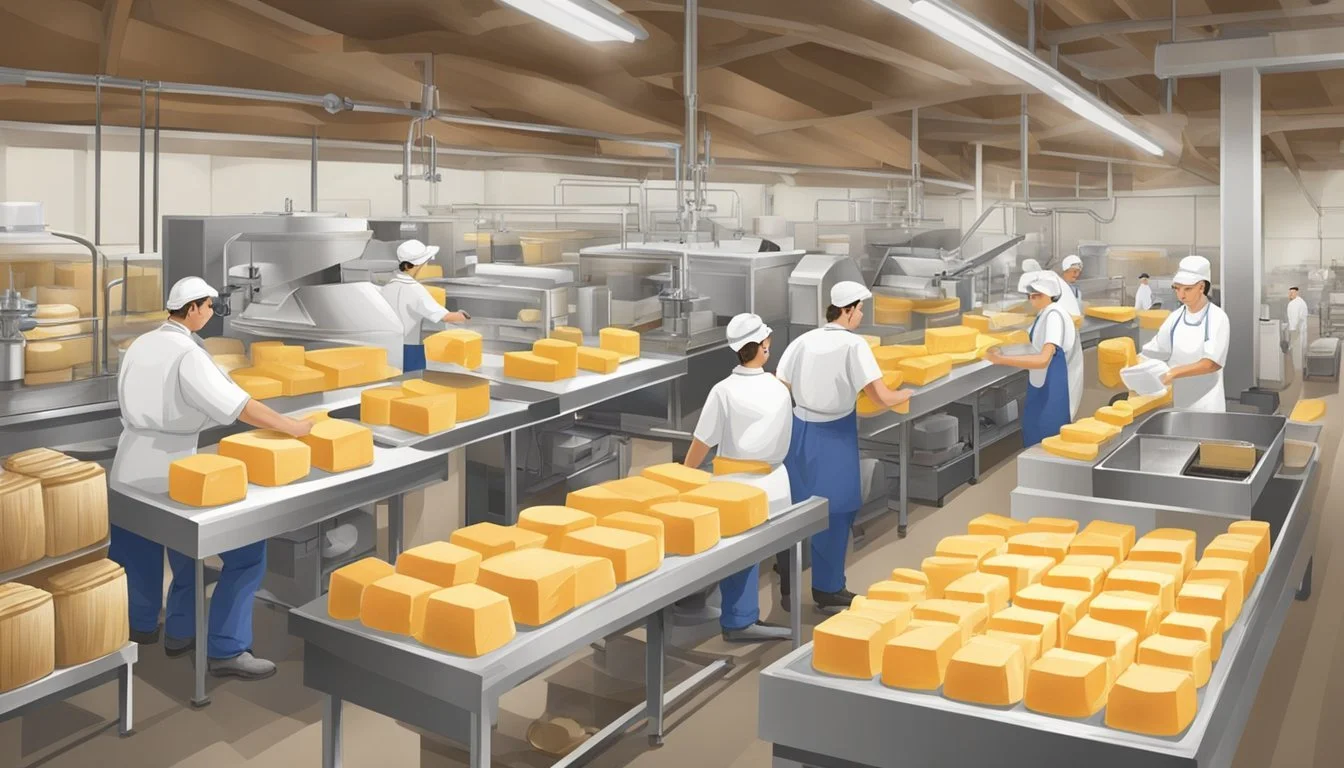Kansas Artisan Cheese
A Guide to the Sunflower State's Finest Dairy Delights
Kansas has become an increasingly prominent player on the national stage for artisan cheese (how long does cheese last?), distinguishing itself with a variety of handcrafted cheese products. The state's cheesemakers leverage locally sourced milk to craft their cheeses, bringing unique flavors attributed to the rich agricultural land. Local creameries such as Alma Creamery, which has operated since 1946, have been pivotal in setting this culinary trend. They pride themselves on their hand-making process, emphasizing a close-knit relationship with Kansas dairy farms.
Artisanal cheese in Kansas comes in a diverse range, from goat milk varieties to traditional cow's milk cheeses. (What wine goes well with cow's milk cheeses?) Holy Goat Creamery, known for their premium selection of handcrafted pasteurized cheeses, exemplifies this variety, using milk from Nubian goats raised on their farm. Similarly, Elderslie Farm produces farmstead goat milk cheeses with milk from their grass-fed Nubian and Saanen goats. This attention to feeding and animal welfare is integral to creating the high-quality cheeses Kansas is celebrated for.
The artisan cheese movement in Kansas extends to educational aspects, where patrons have opportunities to engage with the production process and learn about the craft. Creameries often invite visitors to farm tours and cheese-tasting sessions, providing an immersive experience into the world of cheese-making. The commitment to quality and education among Kansas cheesemakers is setting precedents for artisanal food production, marrying tradition with locally-sourced ingredients to deliver a product that is authentically Kansan.
History of Kansas Artisan Cheese
In Kansas, a burgeoning artisan cheese industry has taken shape, tracing back to farmstead operations. These producers, emerging prominently by 2020, have been crafting cheeses with a focus on quality and traditional methods. The growth of such artisan cheese operations in Kansas reflects a broader revival of artisanal cheesemaking practices across the United States.
Farmstead cheeses are notable within the Kansas artisan scene, representing dairy products made with milk from the producer's own herds. In the case of Kansas, this often involves rich Jersey cow milk, known for its high butterfat content, lending itself to a variety of cheeses with deeper flavors and smoother textures.
Artisan producers prioritize the farm-to-table philosophy, where the entire process of cheesemaking—from milking to aging—is managed on-site, creating a strong connection to the land and the community. These cheesemakers generally produce in small batches to emphasize quality and distinctiveness. The state's diverse climate and geography enable farmers to provide specialized care to their herds, ensuring high-quality milk which is the foundation of their artisan cheese.
Below is an overview of typical artisan cheeses crafted in Kansas:
Cheddar: A classic variety, with a range from mild to sharp.
Cheddar Curds: Fresh, squeaky cheese bites popular for their texture.
Cow's Milk Feta: A tangy and crumbly option.
Fromage Blanc: Creamy and spreadable, showcasing the milk's freshness.
Havarti: Soft, buttery, and often infused with dill or other herbs.
Elbing: A unique Kansan creation, known for its softness and mild flavor suitable for slicing.
The dedication to traditional cheesemaking methods and a deep understanding of the craft has been central to the narrative of Kansas's artisan cheese history, displaying a fusion of time-honored techniques and local innovation.
Types of Artisan Cheese in Kansas
Artisan cheese production in Kansas is as rich in variety as the land itself, offering a range of goat and cow milk cheeses. Each variety reflects the local terroir, carefully crafted to showcase distinctive flavors and textures.
Goat Cheese Varieties
Elderslie Farm and Holy Goat Creamery are prominent producers of artisan goat cheese in Kansas. Elderslie specializes in cheeses made from Nubian and Saanen goats, known for producing milk with robust flavors. Holy Goat Creamery takes advantage of the high-quality milk from their purebred Nubian goats to make handcrafted artisanal cheeses such as fresh chèvre and aged selections. Typical offerings include:
Chèvre: smooth, creamy, with a gentle tang
Feta: crumbly, with a bold, briny flavor
Specialty blends: often infused with local herbs, honey, or olive oil
Cow Milk Cheese Selections
Alma Cheese, with over 65 years of tradition, crafts cheeses from cow's milk sourced from the local Flint Hills region. Their selection often includes cheese staples like brie and camembert, as well as squeaky fresh cheese curds. These cheeses show the following characteristics:
Brie/Camembert: Soft cheeses with a creamy, buttery profile and edible rind
Cheese curds: Mild and firm, known for their signature "squeak" when fresh
Specialty Cheeses and Blends
Kansas cheesemakers often push the envelope by creating specialty cheeses and blends unique to the area. They might introduce a blend of cow and goat milk, or add regional flavors into the mix with bacon, local herbs, or even state-produced sunflower seeds. These cheeses tend to have:
Complex flavor profiles
Enhanced textures from the inclusion of different milk types or additives
Aging and Textures
The cheeses of Kansas range from fresh, unaged varieties to those that have been aged to develop a deeper flavor and more complex texture. The aging process can transform a smooth, mild goat cheese into a firm, intensely flavorful delight. Aging affects cheeses by:
Intensifying flavors
Altering textures from creamy to crumbly or hard
Unique Local Cheeses
Dedicated Kansas cheesemakers like those at Elderslie Farm and farms near Manhattan have created cheeses that are not just sold locally but sought after for their unique taste profiles. With the use of locally sourced milk and an emphasis on small-batch production, these cheeses tend to have:
Rich and pure flavors distinctive to the Kansas terroir
Innovative uses of local ingredients such as herbs and honey to complement the cheese's natural taste
Artisan Cheese Making Process
Artisan cheese making in Kansas involves meticulous attention to detail at every step, ensuring a premium product that stands out for its uniqueness and high quality.
Milk Sourcing and Selection
Artisan cheesemakers typically begin by sourcing high-quality milk from local dairy farmers. For example, creameries like Holy Goat Creamery use milk from Nubian goats raised on Arch Angel Farm. The inherent qualities of milk, such as fat content and flavor profile, heavily dictate the characteristics of the resulting cheese.
Curd Crafting and Pressing Techniques
The formation of cheese curds is a critical phase where artisans control texture and flavor. Cheeses like chévre and feta from Goddard Farm are produced by carefully acidifying milk and adding rennet to form curds. These curds are then cut, stirred, and sometimes heated before being pressed into molds.
Aging and Curing Methods
Aging, or affinage, is where cheese acquires its distinct flavors. Cheesemakers like those in Kansas often age cheese in temperature and humidity-controlled environments. This careful aging process develops not only flavor but also the desired textures, which can range from soft and creamy to firm and crystalline.
Handcrafting and Packaging
Handcrafting encompasses the finishing touches that define artisan cheese, such as the application of herbs or the introduction of molds that form rinds. Cheeses are then hand-packed, ensuring they reach consumers in perfect condition. Handcrafted packaging can include features like being submerged in olive oil with dried tomatoes and green olives, as seen in some feta varieties from Goddard Farm.
Focus on High-Quality Ingredients
Artisan cheesemakers maintain a steadfast commitment to quality, often infusing their cheeses with pure, localized flavors. The use of Flint Hills milk or the addition of hand-selected herbs emphasizes a pledge to quality and a connection to the Kansas terroir.
The Artisan Movement in Kansas
The artisan cheese movement in Kansas epitomizes a renaissance of traditional cheesemaking practices, with a strong focus on local ingredients and community involvement.
Local Creameries and Their Stories
Alma Creamery, renowned for its handcrafted cheese, has been an integral part of the Kansas cheese scene since 1946. Utilizing milk from local cows, it offers a range of artisanal cheeses. Similarly, Holy Goat Creamery in Manhattan embraces local traditions to produce a unique variety of goat cheeses (What wine goes well with goat cheeses?). Elderslie Farm and Arch Angel Farm are also key players; the former is known for its meticulous cheese crafting process, and the latter celebrates the rich flavors of farmstead cheese.
Supporting Local Dairy Farmers
Artisanal cheese production in Kansas heavily depends on collaboration with local dairy farmers. Farms throughout the Flint Hills region, such as Flint Hills Milk, supply premium-quality milk which is the cornerstone of Kansas's artisan cheeses. These partnerships are vital to maintaining the state's rich dairy heritage and supporting the local economy.
Promotion of Handcrafted Traditions
Cheese artisans in Kansas are not just producers; they are custodians of handcrafted traditions. They employ time-honored skills to create cheeses that reflect the region’s character. Techniques passed down through generations are esteemed over industrial methods, ensuring each product from these creameries is a testament to the artisanship of Kansas cheesemakers.
Community Engagement and Education
Creameries engage with their communities through educational tours, tastings, and participation in local markets. They foster a deeper understanding and appreciation of the cheesemaking process. This engagement promotes a close-knit relationship between consumers, creameries, and farmers, strengthening the local food system in Kansas.
Culinary Uses of Kansas Artisan Cheese
Kansas artisan cheese, with its diverse flavor profiles, plays a significant role in local cuisine, pairing beautifully with regional produce, featuring in traditional Kansas dishes, and enhancing the experience at tasting events and tours.
Pairings with Local Produce
Artisan cheeses from Kansas, with their range from mild to robust flavors, are excellent when paired with fresh, local produce. A simple yet elegant pairing could involve:
Mild cheddar or gouda with slices of crisp apples or sweet pears
Aged cheeses (What wine goes well with aged cheeses?) with a drizzle of Kansas honey to balance their complex flavors
Fresh cheese curds tossed in a salad with garden vegetables and a light vinaigrette
Such combinations allow the cheese's flavor profile to complement the fresh, earthy notes of the produce.
Inclusion in Kansas Cuisines
Chefs in Kansas restaurants ingeniously incorporate locally-sourced artisan cheese into various dishes, creating a unique dining experience that reflects the region’s culinary heritage. They often:
Add a rich, creamy texture to soups and stews with soft, spreadable cheeses
Top burgers and sandwiches with slices of sharp cheddar or pepper jack for an added kick
Elevate side dishes like mashed potatoes or gratins with a generous helping of gouda or cheddar, creating a hearty, comforting flavor profile embraced by Kansas diners
These practices support local dairy farmers while bringing out the best in Kansas flavors.
Cheese Tasting Events and Tours
Artisan cheese producers in Kansas host events and tours that showcase the variety and complexity of their cheeses. These experiences often involve:
Guided tastings where participants learn to identify different flavor profiles and textures
Pairing artisan cheeses with local wines, craft beers, or specialty foods like Kansas honey or handmade bread
Demonstrations of cheese-making processes that emphasize the craftsmanship behind the product
Such events celebrate the state's artisan cheese culture and educate consumers on the nuances of high-quality cheese production and enjoyment.
Economic Impact of Artisan Cheese Production
Artisan cheese production in Kansas contributes significantly to the state's economy, showcasing the interplay between traditional dairy farming and modern marketing strategies.
Contribution to Local Economy
Artisan cheese businesses in Kansas enhance the local economy by providing high-quality cheeses that cater to a niche market. They often sell their products locally, resulting in the circulation of money within the community. Restaurants and retailers have eagerly adopted locally produced cheeses, setting the stage for a symbiotic relationship that bolsters economic growth.
Restaurants: Incorporating Kansas's artisan cheese into their menus, contributing to the restaurants' unique offerings and customer appeal.
Retail: Specialty shops and local markets stocking Kansas's artisan cheese support local commerce.
Sustainable Farming and Breeding Practices
Artisan cheese producers in Kansas are at the forefront of implementing sustainable farming and breeding practices. They often favor purebred Nubian goats, known for their high-quality milk, ideal for cheese production. This selective breeding not only ensures a superior product but also promotes genetic diversity and sustainability in dairy farming, further solidifying the state's reputation for pure, locally-sourced dairy produce.
Breeding: Focus on purebred goats ensures the continued availability of high-grade milk.
Farming: Conservation of natural resources through sustainable agriculture supports long-term viability.
Creating Jobs and Supporting Kansas Communities
By handcrafting cheese, artisans generate employment opportunities in Kansas. They support the Kansas communities by hiring local dairy farmers, providing training in the craft of cheesemaking and contributing to the state's overall job market.
Jobs: On-farm positions, production, marketing, and sales roles within the artisan cheese sector.
Community Support: Artisan cheese producers often engage with local businesses and contribute to community events, enriching cultural life.
The Future of Kansas Artisan Cheese Industry
The Kansas artisan cheese industry is poised for growth, with innovations in production techniques, an expanding selection of cheeses, and a focus on education to sustain this trajectory.
Innovation in Cheese Making Techniques
Kansas cheesemakers are adopting advanced techniques to improve the quality of their small-batch cheese production. They are integrating modern technology with traditional methods to enhance flavor profiles and ensure consistency in their artisan cheeses. Precision in controlling the aging environment, for example, leads to a superior end product. Techniques such as using microbial cultures with specificity to the milk sourced from Jersey cows, are being refined to perfect the art of pasteurized cheeses production.
Expansion of Cheese Varieties and Flavors
There's a noticeable trend towards diversification in the range of artisan cheeses being offered in Kansas. With a strong demand for unique cheese varieties, producers are expanding beyond traditional cheddar into more exotic flavors and textures. This includes the creation of original cheeses such as Elbing, which is exclusive to Kansas. Cheesemakers are experimenting with different types of milk and aging processes to develop new flavor profiles that cater to an evolving consumer palate.
Educating the Next Generation of Cheesemakers
Investments are being made to educate the next generation of Kansas cheesemakers, ensuring the longevity and quality of the industry. Through comprehensive training programs and workshops, knowledge about the intricacies of artisan cheese production—from milk handling to cheese aging—is being passed down. This educational push is pivotal to maintain high quality standards and to foster innovation in the industry.

